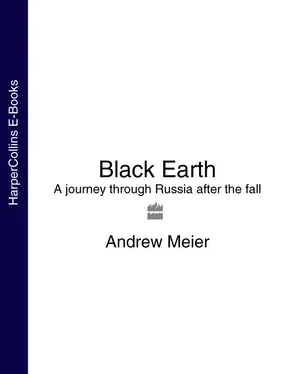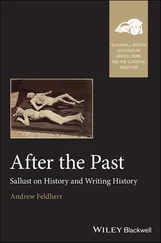“That’s the apartment of Mikoyan, designer of the MiG,” Nikita Khrushchev told me one evening as we toured the building where he had lived since childhood. “And in that apartment,” he exclaimed, “lives Lenin’s niece!”
Just below the IMF chief, in a sprawling apartment filled, I imagined, with an overstuffed Warsaw Bloc living room set, lived Grigori Vasilievich Romanov, among the oldest of the old guard. One sub-zero afternoon in midwinter, as the air chilled to a glass-sharp edge, I set out to meet Romanov. He commanded me to stand, alone, on Ulitsa Tverskaya beneath the iron statue of Yuri the Long-Armed, founder of Moscow. Across the street looms Luzhkov’s office, the lavishly remodeled Moscow Communist Party headquarters. A red electric sign at the Central Post Office flashed seventeen degrees below zero. I spent twenty minutes examining every passing face, but I had patience. I had been waiting to see Romanov for two years.
I spied him shuffling slowly, painfully, down the crowded sidewalk long before he spotted me. As he approached, a silver Mercedes, a For Sale sign taped to its rear window, nearly ran him down. He was short, no more than five feet five inches, and I remember hearing how Romanov, back when he was in the Politburo, had placed his desk atop a raised platform to make himself appear more imposing. He wore a gray topcoat, with a thin sweater beneath. A faint stubble shaded his sagging square cheeks; tuffs of gray jutted from beneath his brown fur hat. At seventy-five, and despite a recent heart attack, he was in far better shape than his phone voice had led me to believe. His pale blue eyes, however, were tearing from the cold wind.
“It’s not that I don’t trust journalists,” he declared straight off, dabbing his eyes with an ironed blue handkerchief “I don’t trust anyone. But someone has to say what has happened here. Someone has to speak of Russia’s misery.”
Romanov came to the West’s attention in the 1980s, when he and Mikhail Gorbachev served as lieutenants to Andropov and his ailing successor, Konstantin Chernenko. Romanov was the darling of the Politburo’s hawks, the truest of the cold warriors, but upon Chernenko’s death, he was ousted by Gorbachev. He had not spoken to a foreigner in years. “The only people he hates more than foreigners,” joked Nikita, “are reporters.” But I had long badgered him, calling him first thing in the morning once or twice a week. At last he relented. He agreed to meet-only in public, “in an hour.”
His rant that winter day was almost pauseless. “Gorbachev will pay for his sins! I can’t stand the sight of his pig’s mug! He’s a traitor! A traitor to the Motherland! He’s sniveling about how no one here thanks him, about how ungrateful Russians are to him. To hell with Gorbachev. He started this disaster. He was a catastrophe, a peasant who had no right coming to the big city … Yeltsin? Who is Yeltsin? A swine who drinks. He got drunk on power. I can’t even speak of him. He’s a criminal. A common thief who’s robbed his Motherland and killed his people. All these Gaidars, Berezovskys, these so-called oligarchs, they’re all Yeltsin’s little children. Now they want to ban the Communist Party. Do you think all people are born the same? Of course not. Some are born to make things – to create, build, and work. Others are born to take, to steal. Gorbachev is one of the takers. He started the fashion. Now look where it’s led us.”
To some, Grigori Romanov was an oddity, a hapless relic shuffling toward his life’s end. He was, to be sure, a diehard Communist who had chewed sour grapes ever since he fell hard from the Soviet Olympus. But oddly enough, in advanced retirement, far from his rarefied life among the Party elite, Romanov echoed the lament of many a common man in Russia. In the years after the Soviet collapse, he had found company. Romanov had no power now, but he took solace in the knowledge that millions of Russians shared his views. His principal conviction – Ran’she bylo lushche (“Things were better before”)–had become the motto of his generation. And the dirty secret, only conceded in the capital sotte voce by the ascendant Young Reformers, was that they were right. For many of his generation, things were indeed better before – for them.
Romanov lived on some sixty dollars a month. As a veteran of the blockade of Leningrad, he said he deserved much more. “I’m entitled to several war pensions. I’m a veteran and an invalid. And I received the Hero of Soviet Labor. Politburo privileges? What a joke! We have nothing. No dacha, no car, no privileges at all. Only the apartment.”
Once it was a very different story. After rising through the Party ranks, he ran Leningrad, Russia’s second city, for twenty-five years, until he was summoned to Moscow by Andropov in 1983. He survived various Politburo wars, until he was finally outflanked by the ascendant Gorbachev.
“In February 1985, Chernenko called me out to the dacha,” Romanov told me. “He was weak. He sat up in bed. I stood beside him. ‘Just wait,’ he said. ‘Relax. It’ll come to pass.’ He relied on the defense sector. He knew the importance of our work. He never wanted Gorbachev … We all knew Chernenko couldn’t last long. He was in very bad shape. So were most of the others, for that matter. They were all old and sick. Gromyko and the rest. There were two candidates discussed at that time: Vladimir Shcherbitsky and Romanov … No one talked about Gorbachev with any seriousness.”
A few weeks later Chernenko died, and within hours Gorbachev wrested control of the Politburo in a late-night five to four vote. It was a bit of spectacular luck, or so his biographers have held, that the three committee members who were Gorbachev’s chief opponents were absent from Moscow.
“The week before Chernenko died, my wife and I flew to Vilnius,” Romanov said. “They had given us a trip to Lithuania, to a sanitarium. The day Chernenko died, we were there. They said the plane would only fly the next day. They met that day, hours after he died. But the three most senior members of the Politburo weren’t present! Kunaev was in Almaty. Shcherbitsky was in the States. And I was in Lithuania. By the time we got back to Moscow he’d already done it. That fast. That was it. It was agreed to in public of course at the Politburo meeting and at the plenum. But he’d already cut the deal in secret with all of them. And you think the timing, Chernenko’s death, I mean, was all accidental?”
In the aftermath Romanov was stripped of power. He had long been renowned as an epicurean lush, ridiculed as the “Last of the Romanovs.” Gorbachev’s cronies played upon that reputation, spreading the rumor that to celebrate his daughter’s wedding. Romanov had ordered the caterers to use Catherine the Great’s Sèvres from the Hermitage. Worse still, the story went, a few pieces had been smashed. By July Romanov had been summarily retired and sent, according to another rumor fed to reporters, to dry out.
Did he ever regret, I wondered, not making it to the top?
“No,” he retorted. “I’m just sorry the wrong man did. The traitor. Because if it had been me, the invasion never would have happened.”
Please, put it in a bank … Please, let’s put it in a foreign bank .
–Vladimir Putin advising the relatives of those who died on the nuclear submarine Kursk on what to do with their compensation 7
EVER SINCE RICARDO, economists have built intricate mathematical models to explain and forecast how markets will move. Calculus, however, assumes reason. When Russia crashed in the summer of 1998, there was little rational about it. “Lenin is said to have declared that the best way to destroy the Capitalist System was to debauch the currency,” John Maynard Keynes wrote in 1921. “Lenin was certainly right. There is no subtler, no surer means of overturning the existing basis of society than to debauch the currency. The process engages all the hidden forces of economic law on the side of destruction, and does it in a manner which not one man in a million is able to diagnose.” Russia under Yeltsin was less a test market for the “Invisible Hand” or shock therapy than a new Babylon where the wheeling and dealing were nasty, brutish, and, for many in August 1998, lethal.
Читать дальше












